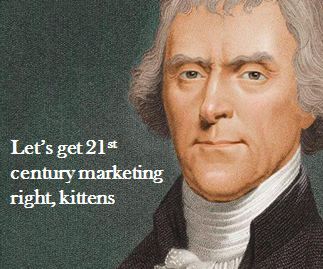Something Like Democratic Marketing
 Set against marketing messages, I would rather listen to my neighbor’s opinion of a product. A critic’s opinion. An expert’s. Any idiot with an Internet connection, in fact (according to our research, review content from complete strangers is more trustworthy than messages from brands).
Set against marketing messages, I would rather listen to my neighbor’s opinion of a product. A critic’s opinion. An expert’s. Any idiot with an Internet connection, in fact (according to our research, review content from complete strangers is more trustworthy than messages from brands).
The payload of this realization – that marketers’ messages are overinvested in by a million percent and underdeliver by an equal value – strikes our marketing foundations, oh so softly. Thud. Pop. Distant thunder.
Simultaneously it’s never been easier for other people to write about our brands, to create breathtaking personal tributes to our products, to call out our worst policies, and even to slander us. The crowds have snatched the megaphone and they won’t give it back.
These are two factors in a big equation that we’re still only beginning to calculate.
So far, we’ve dealt with these changes pragmatically and conservatively.
Community management is a perfect example of the pragmatic response. Community management is just a series of tribal agreements about playing rules. The brand will not allow threads that include the word “shit”. The brand will retweet only tweets from registered users. The brand answers requests within one hour between 9 AM and 9 PM EST. The brand will blog politely about its topic.
The marketing fortress has collapsed, the mobs are baying for blood, and the sop you throw this change is to play nice? This is what I’d call the Marie Antoinette response.
What’s needed is more-dramatic action. Some of the vendors I like most these days take the factors I mentioned above at face value. TechValidate aims to turn a marketers' customers into its primary content creators. Tongal crowdsources a brand’s video advertising. TapInfluence formalizes dozens, if not hundreds, of influencer relationships. ThisMoment treats UGC as a core asset.
These are the tools of a new kind of marketer, one that sees the job as one of inspiring and governing activity around a dynamic and organic brand.
However, all of these tools require a crucial piece of insight and guidance from marketers – the overarching framework against which value and meaning are managed. Some examples:
- In buying into a partnership on content with your brand, what can a contributor expect?
- How will the stories and messages partners create be repurposed in the future?
- What will your brand do to promote the stories that I sweat and bleed over?
- Against which big ideas can I hope to contribute my time and interest?
Today’s answers are a) money; b) not your concern, you’ve been paid; c) ditto; and d) ditto. This is a catastrophe. What we need today: Open, fully transparent compacts with partners that are more muscular than the pitiful community management rules, richer than simple financial exchanges, and more lasting than a marketer’s memory.
At the end of my report Build Your Content Brand By Delivering Customer Value, I began to sketch what these compacts would look like, under the headline “Content marketing leads to democratic storytelling.”
Two other macrotrends point towards the need for what you might call stronger marketing constitutions: Privacy and technology ecosystems. Each of these, together with decentralized marketing, demand high-level, principled statements of “this is what we’re all about and this is how you can work with us” that are policed, nurtured, and protected.
Marketers should not be the greatest threat to a business’s effective marketing. They should be its leading defenders. That defense requires new, open principles. This is a cry to get busy on those principles.
